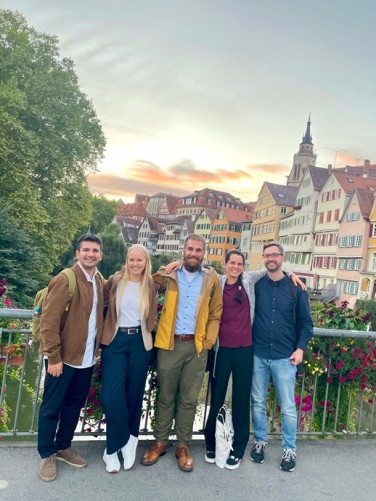Soil Mineralogy and Soil Chemistry

Welcome to the Department of Soil Mineralogy and Soil Chemistry
Soils are the interface of the atmosphere, hydrosphere, lithosphere and biosphere and fulfill multiple functions in the ecosystem, but also for mankind. Soils do not only form the basis for human food production and purify our drinking water, they also protect us from pollutants released into the environment.
Prof. Dr. Moritz Bigalke,
Head of the Department of Soil Mineralogy and Soil Chemistry
Soil is the basis of our life. It must be preserved and protected. Therefore, our working group investigates the behavior and effects of pollutants in soil.


Our research
Our research focuses on the biogeochemistry of contaminants in soils to contribute towards the preservation of essential soil functions. We primarily investigate (trace) metals and plastics particles at macro, micro and nano sizes within the soil system, their interactions with the soil solution and their uptake by plants. We develop innovative methods to identify, quantify and characterize these substances in the environment, and investigate processes from the nano to the field scale through field investigations and experimental approaches.
News from our department
-
![]() Picture: Collin Weber
Picture: Collin Weber![]() Picture: Collin Weber
Picture: Collin WeberNew research project on tyre abrasion in soils funded
November 04, 2025
Geospatial Record and Interpolation of Tire Wear Pollution in Roadside Soils
-
![]()
![]()
DBG Conference 2025 in Tübingen
October 01, 2025
-
![]() Picture: Collin Weber
Picture: Collin Weber![]() Picture: Collin Weber
Picture: Collin WeberMicroplastic sampling of high alpine soils and glaciers
July 23, 2025
Tour in the high alpine region
In June 2025, members of the Soil Mineralogy and Soil Chemistry group, together with Prof. Dr. Stephan Weinbruch (Environmental Mineralogy) and the active support of Thomas Dirsch and others, were active in the Kaunertal (Austria) for a sampling campaign.
-
![]() Picture: FG Bodenmineralogie und Bodenchemie
Picture: FG Bodenmineralogie und Bodenchemie![]() Picture: FG Bodenmineralogie und Bodenchemie
Picture: FG Bodenmineralogie und BodenchemieFiF Project „ForestHealth“
July 23, 2025
An interdisciplinary project on the state of the forest ecosystem in southern Hesse
As in many other regions of Germany, the condition of forests in southern Hesse has deteriorated noticeably in recent years. When assessing the condition of forests, attention is often focused exclusively on the tree population, without taking into account the forest floor as the foundation of the forest ecosystem.
-
![]() Picture: Collin Weber
Picture: Collin Weber![]() Picture: Collin Weber
Picture: Collin WeberNew article: Tracks of travel
March 05, 2025
Research on tire particles and associated pollutants in Swiss cantonal road soils
-
![]() Picture: FG Bodenmineralogie und Bodenchemie
Picture: FG Bodenmineralogie und Bodenchemie![]() Picture: FG Bodenmineralogie und Bodenchemie
Picture: FG Bodenmineralogie und BodenchemieTrip to ESA
February 19, 2025
This time, the soil mineralogy and soil chemistry working group excursion took us to the stars
-
![Gewinner des Athene Preises 2024 mit Jürgen Mutzl und Kai Nitsche]() Picture: Klaus Mai
Picture: Klaus Mai![Gewinner des Athene Preises 2024 mit Jürgen Mutzl und Kai Nitsche]() Picture: Klaus Mai
Picture: Klaus MaiAthene Department Award for Good Teaching to Jürgen Mutzl and Dr. Kai Nitzsche
December 02, 2024
The institute congratulates the two award winners
Award given on the TU's annual Teaching Day on November 20, 2024, for the 'Project Seminar' in the international master's program TropHEE – Innovative teaching format for technical and interdisciplinary skills.






















